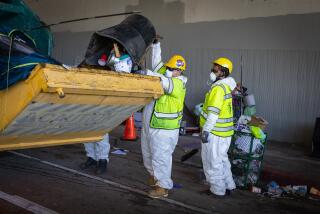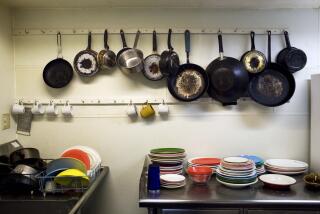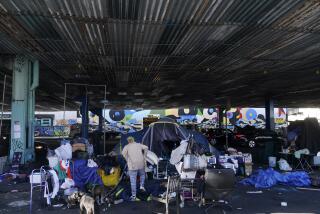From comfy hammocks to coffee presses, retailers roll out luxury camping items
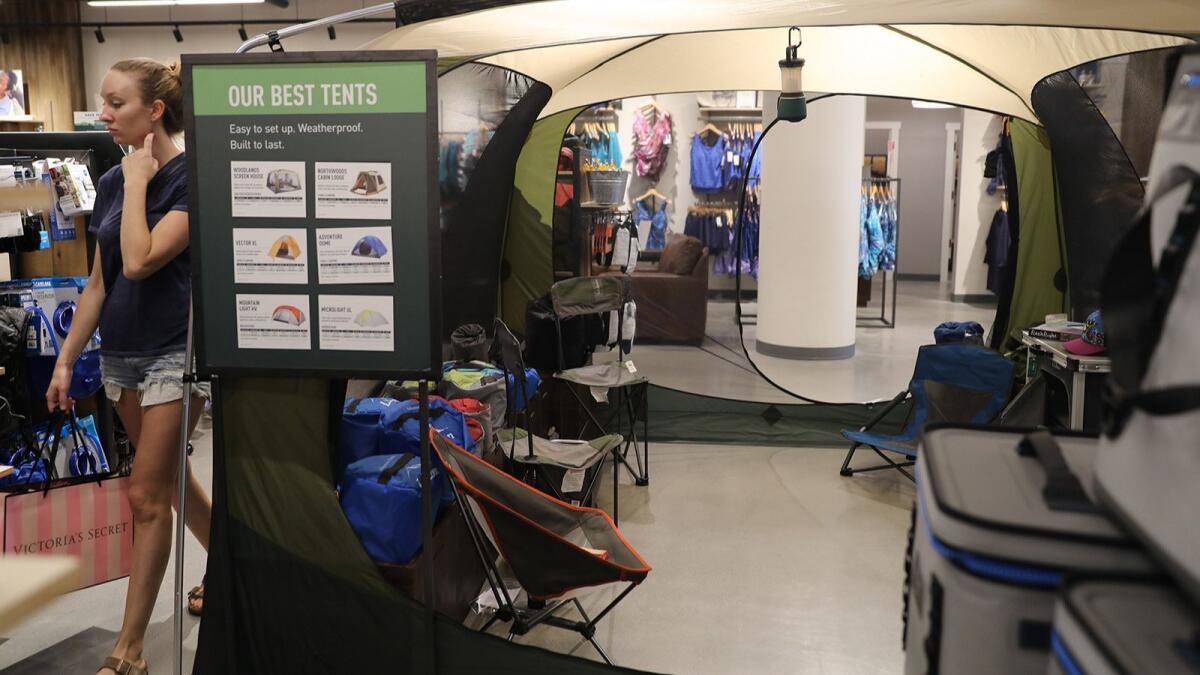
Tent? Check. Sleeping bag? Check. Rocking chair, air mattress and insulated coffee press?
Hard-charging backcountry adventurers might scoff at the idea of lugging such luxuries. But for many, getting outside doesn’t mean going off the grid, and camping retailers are rolling out items that let consumers bring at least some of the comforts of home into the great outdoors.
“The people going to go on a three-week hike and take everything on their back, that was the ideal consumer 10 years ago,” said Matt Powell, senior advisor for the sports industry at NPD Group, a market research firm. “Now, it’s someone driving to a state park, sleeping next to their car in a tent and trying to bring as many creature comforts as they can.”
Sydney Even, 24, of Glencoe, Ill., said she aims for a happy medium between bare-bones camping and “glamping,” and takes a battery-powered air mattress on weekend camping trips.
“It helps get more of my friends into it that aren’t big outdoors people,” said Even, testing out a rocking camp chair at the Northbrook, Ill., REI late last month. She was picking up a solar-powered lantern for a weekend trip to a campsite outside Indianapolis.
Camping’s popularity has been relatively steady over the last decade, according to a 2018 report from the Outdoor Foundation, a not-for-profit established by the Outdoor Industry Assn.
But a separate survey suggests that the type of camping trips being taken has shifted as outdoor enthusiasts opt for more frequent excursions and stay closer to home. The percentage of people who camped three or more times in a year grew between 2014 and 2018, as did the share of campers traveling fewer than 50 miles from home, according to a survey from Kampgrounds of America, a franchise with more than 500 locations in North America.
Paul Calandrella, general merchandising manager for camping at REI Co-op, points to fast-paced, always-connected lifestyles that make it tough to embark on lengthy, off-the-grid excursions but leave consumers craving ways to escape and explore the outdoors.
For others, a shorter, less-rustic trip can be a way to boost confidence in their ability to tackle an adventure, said REI shopper Liz Ramirez.
“There’s a fear you won’t succeed, or don’t have the ability to think through a problem,” said Ramirez, 48, of Chicago, who is preparing for a trip where she’ll hike between huts rather than carry all her gear.
Whatever the reason, casual trips close to home, a vehicle or cabin rental make it easier to travel with items such as campsite furniture, well-stocked coolers and kitchen equipment, Powell said.
Young, urban consumers, in particular, are also less likely to have a big basement or garage to stuff with gear and either choose pursuits that require less equipment or rent big-ticket items before a trip, Powell said.
Even as overall camping equipment sales held steady over the 12 months that ended in March compared with the prior year, sales of camp tables and portable audio and phone accessories rose 20% and consumers spent about 25% more on insulated beverage containers, according to NPD Group.
“It’s really about taking my normal life out there with me,” Powell said.
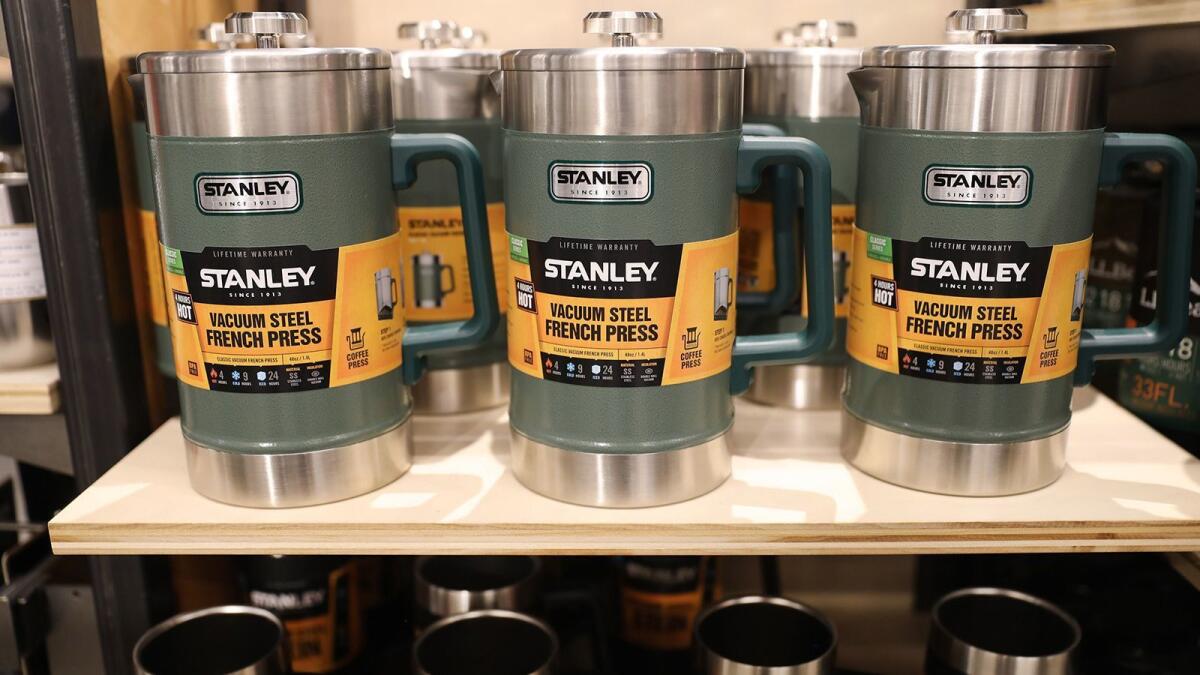
For some, that includes technology. A few years ago, spotty cellphone service in many outdoor areas made traveling with portable chargers “somewhat irrelevant,” said Michael Parker, director of sales and marketing at Chicago-based LuminAID. The company makes solar-powered phone chargers and lanterns designed for international aid workers but also sold to outdoor enthusiasts.
Now that cell service is more widely available and many consumers use smartphone cameras to document their adventures, there’s more interest in tech accessories for the outdoors, Parker said.
Outdoor brands and retailers say they’re focusing more on consumers taking a social, recreational approach to their outdoor pursuits in recent years.
A few years ago, outdoor brands tended to focus on the “uber-athlete,” said Mike Gawtry, director of sporting equipment and travel products for L.L. Bean. But most of the brand’s customers aren’t preparing for a winter camping expedition or high-altitude ascent — they enjoy the outdoors, but really care about time with family and friends, he said.
“The primary focus we have designers and developers working on are really those products that enable folks to get outside in the safest, most comfortable, easiest way,” he said.
Chicago-based outdoor and travel gear maker Grand Trunk has seen sales of technical products, such as lightweight hammocks that pack down to a tiny size or come with a mosquito net, level off, while products focused on comfort and fun, including hammocks with creative patterns, have grown, said marketing director Kyle Wood.
Grand Trunk plans to introduce new products next year inspired by ways it has seen customers using its hammocks on social media: hammocks that let users swing while sitting upright around a campfire or working on a laptop.
“Sometimes, laying in a hammock is not the most social posture,” he said.
Brands are adjusting to consumers’ shifting tastes, if not always as quickly as REI would like, Calandrella said.
Younger consumers want quality gear but are less likely to care about the fact that a product is ready for a major mountaineering expedition if they’re only planning to hit the trails in their local forest preserve, he said.
They want products that are “technical enough for the experience they’re going to have, then have fun personality that might attract someone who doesn’t want their grandfather’s Coleman gear,” he said.
NPD Group’s Powell thinks the industry needs to move a lot faster. But REI also doesn’t want to alienate customers who still value the rugged, performance-oriented gear, Calandrella said.
“We have to protect that core customer that views things through a technical lens. It’s a heritage business for us, and we don’t want to abandon the member base that helped build this wonderful co-op,” he said.
